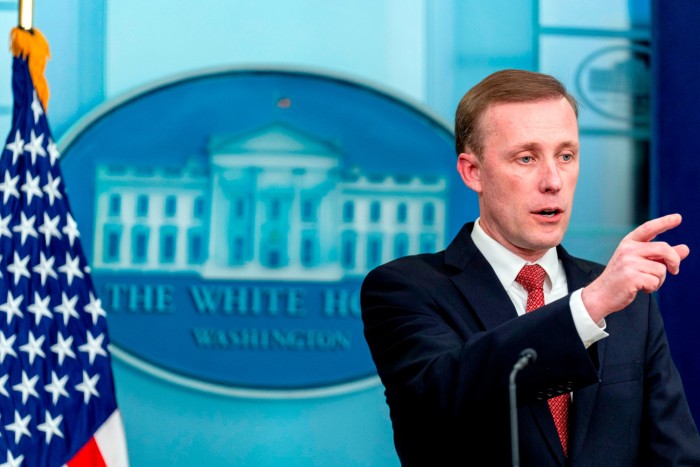Unlock the Editor’s Digest for free
Roula Khalaf, Editor of the FT, selects her favourite stories in this weekly newsletter.
Joe Biden warned Benjamin Netanyahu on Monday that an assault on Rafah “would be a mistake”, as he asked Israel’s prime minister to send a delegation to Washington with alternative plans for the next stage of its offensive against Hamas in Gaza.
In his first call with the Israeli leader in a month, the US president expressed his sharpest opposition to Netanyahu’s plans to launch a ground invasion in Rafah, the last remaining population centre in southern Gaza unoccupied by Israeli forces.
While Biden had previously said he did not want Israel to enter Rafah without a plan to protect civilians, he told Netanyahu that he believed Israel could achieve its goals there “by other means”, US national security adviser Jake Sullivan said.
Netanyahu agreed to send intelligence and humanitarian officials to Washington “in the coming days”, Sullivan said, to “hear US concerns about Israel’s current Rafah planning and to lay out an alternative approach that would target key Hamas elements in Rafah and secure the Egypt-Gaza border without a major ground invasion”.
The US does not expect Israel would begin any invasion until those talks take place, Sullivan said. He rejected Netanyahu’s argument that “raising questions about Rafah is the same as raising questions about defeating Hamas”, saying: “Anytime I hear an argument that says if you don’t smash into Rafah you can’t defeat Hamas . . . that is a straw man.”
In the call, Biden said the US was concerned that there were more than 1mn refugees in Rafah with nowhere to go. The city is a primary entry point for humanitarian assistance and Egypt is deeply worried about Israel’s planned operation.
“A major ground operation there would be a mistake. It would lead to more innocent civilian deaths, worsen the already dire humanitarian crisis, deepen the anarchy in Gaza, and further isolate Israel internationally,” Sullivan said.
Netanyahu, in a short video statement released after the call, said he and Biden had spoken about “the latest developments in the war, including Israel’s commitment to achieving all the goals of the war: the elimination of Hamas, the release of all our hostages, and ensuring that Gaza will no longer pose a threat to Israel — while providing the necessary humanitarian aid that helps achieve these goals”.
Sullivan also appeared to confirm the death of Marwan Issa, Hamas’s number three military official in Gaza in an Israeli air strike in central Gaza two weekends ago.
Israeli officials have said they targeted Issa and he was likely to have been injured, but had so far held off from confirming the death of a military commander nicknamed “the shadow man”.
Ties between Netanyahu and Biden have grown increasingly strained in recent months. The US has demanded that Israel do more to alleviate the humanitarian crisis in Gaza, formulate what US officials have called a “credible” plan for evacuating more than 1mn Palestinians sheltering in Rafah, and begin realistic discussions about the aftermath of the war.
Amid increasing criticism from Biden and other Democratic party leaders, Netanyahu has seemingly doubled down, vowing that not even Israel’s close allies would stop a Rafah offensive, which he has described as integral to the achievement of “total victory” over Hamas.
“There is international pressure to prevent us from entering Rafah and completing the work [of destroying Hamas]. As prime minister of Israel, I reject this pressure,” Netanyahu told Israeli troops last Thursday.
Netanyahu has also rejected comments by Democratic Senator Chuck Schumer — subsequently praised by Biden — that the long-serving Israeli premier had “lost his way” and that new elections were required.
Speaking on Monday to the leadership of AIPAC, a pro-Israel lobby group, Netanyahu again insisted that the Israeli people were “united” behind his war strategy and rejected Schumer’s criticism that he was driven by a desire for “political survival”.
“They keep saying that local politics is interfering with [victory in the war]. They may be right. On which side of the pond?,” Netanyahu said.
Amid the US push for a ceasefire and hostage release deal in Gaza, an Israeli delegation led by David Barnea, head of the Mossad intelligence agency, arrived in Doha for follow-on talks with international mediators.
Sullivan on Monday said the talks, though challenging, were ongoing.
“So far, this deal has been more elusive than we would have hoped, but we will keep pressing because we regard this as an urgent priority,” he said.
The US has been working with Qatar and Egypt on an agreement that would halt the fighting between Israel and Hamas and release more than 100 Israeli captives still held in Gaza. But the mediators have struggled for weeks to narrow the wide gaps between the warring parties.
Israel’s delegation was granted a wider remit by the Israeli cabinet to negotiate on the basis of Hamas’s latest response on a possible framework agreement that would see a six-week truce and the release of some 40 Israeli hostages as well as hundreds of Palestinians held in Israeli jails.
